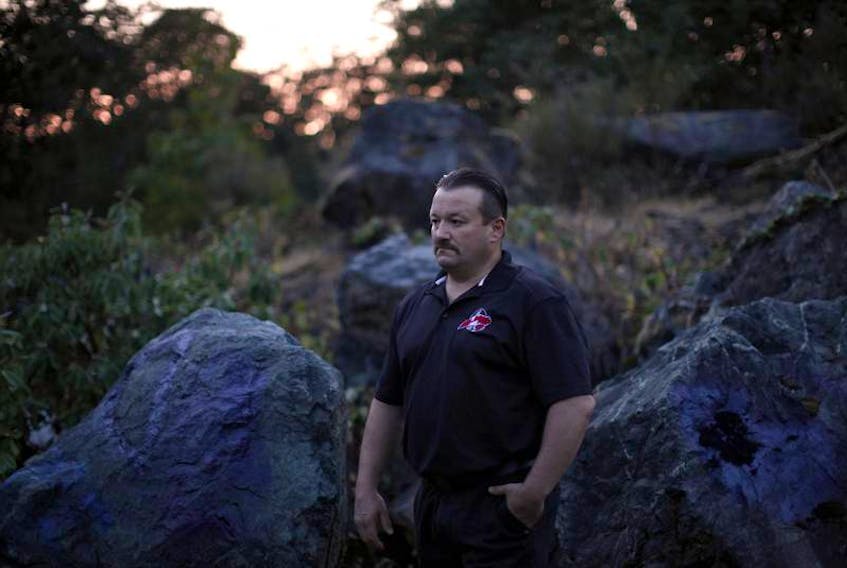ST. JOHN'S, N.L. — Warning: this article contains disturbing content.
It’s what Greg Parsons would have said as he looked directly at killer Brian Doyle in British Columbia Thursday.
“The damage that the sadistic murdering butcher Brian Doyle (caused) has scarred and tormented me and my family for all of my adult life,” Parsons said in his victim impact statement, which he can only submit, because although parole hearings won’t be postponed during the COVID-19 pandemic, he cannot attend in person.
Parsons and his wife, Tina, decided to release the statement publicly.
“Every time I close my eyes and try to go to sleep I think of watching the video of him confessing to Mom's murder. I picture him making statements such as he left the party, (a) 10-minute walk from Mom's house, and before he left the party he took someone else's shoes to cover his tracks, snuck in through (a) basement window, took a knife from Mom’s kitchen drawer, disrobed in my old bedroom and jumped in bed with my mother with sex on his mind,” the statement said.
Parson’s mother, Catherine Carroll, was murdered on New Year’s Day 1991. Parsons, then 19, found her Jan. 2, 1991, in a pool of dried blood on the bathroom floor in her home at 16 James Pl. in St. John’s. Eight days later, he was arrested and charged with first-degree murder.
Parsons was wrongfully convicted of the crime in 1994 and exonerated in 1998 due to DNA evidence that proved he didn’t do it.
Doyle, who lived in the neighbourhood and was known to the family, pleaded guilty, and in 2003 was sentenced to life in prison with no eligibility for parole for 18 years.

Although the Parole Board of Canada won’t confirm exactly where Doyle is serving his time, Parsons attended a hearing two years ago for a temporary-absence hearing for Doyle at William Head Institution, a minimum-security institution consisting of 87 acres of federal land located at the southern tip of Vancouver Island in Metchosin, B.C., about 30 kilometres northwest of Victoria, and surrounded on three sides by the Pacific Ocean.
Instead of giving his victim impact statement in front of Doyle and the parole board, Parsons and other victims' families across Canada who previously planned to attend parole hearings — now affected by shutdowns and closures due to the COVID-19 crisis — must submit their statements to be placed in the files.
“It horrifies me to know that my mom had to run to the bathroom and try to fight for her life while being pursued by this savage,” Parsons said in his statement.
“It’s had such an impact on me knowing that he held my frail mother down and slashed her 53 times, almost cutting off her face, and then jumped into the shower while she was dying or dead on the bathroom floor. … It sickens me to feel that I was accused of this horrific crime. It still haunts me 29 years later (that) he was free for 12 years while I wore the mask of his crime.”
"I feel sick that you would even consider putting him back into the community." — Greg Parsons victim impact statement
According to Parsons’ statement, Doyle tried to retaliate with Parsons’ family.
“He has never been punished for my mom's murder, he was never punished for framing me. This man should not be released from prison, this man should be put back into a proper federal institution such as Dorchester or (the Atlantic Institution in Renous, N.S.),” Parsons said in the statement.
“At the hearing I attended two years ago, you said that he's a moderate risk to offend. I have to disagree with you. He's a major risk to reoffend and I feel sick that you would even consider putting him back into the community.
“There will never be forgiveness in my heart for this monster. It is so hard to believe that after 29 years I would be still looking for justice for Mom. How can you put into words the impact that this has had on my life? I struggle with PTSD. I have night terrors. I still see her bloody body on the bathroom floor every time I close my eyes.”
Parsons begs the parole board not to let Doyle return to Newfoundland and Labrador when he is finally released.
“I'm very disappointed with the parole board for not postponing this hearing during this never-before-seen pandemic to allow me to attend to fight for my mom. I wasn't going to write a victim impact statement because I figure you're going to let him out anyway and you are not going to postpone this so I can attend — why bother?” Parsons said.
“I’ve decided instead to have my say anyway, but in a public forum, to raise awareness with how Corrections Canada and the parole board are dealing with these very violent offenders, as this is happening to families of victims right across this country. What deterrent is there for criminals not to kill our loved ones and where is the justice for those loved ones who have been butchered?”
He said Doyle would be judged by a higher power, as his soul is damned.
Reviews proceeding
The Parole Board of Canada (PBC) confirmed for The Telegram this week it is still conducting hearings during the COVID-19 pandemic.
Eligibility for conditional release is legislated under the Corrections and Conditional Release Act (CCRA) and timeframes for review are prescribed by the Corrections and Conditional Release Regulations, said Lisa Saether, regional manager of community relations and training for the Parole Board of Canada, Pacific region.
Eligibility dates are calculated by the Correctional Service of Canada, and the PBC must review an offender’s case in accordance with the legislated timeframes, Saether said.
“In an effort to protect the health and safety of the public, inmates, PBC board members and staff, in response to the COVID-19 pandemic, the PBC is currently conducting its hearings remotely via videoconference outside of correctional institutions and is unable to facilitate victim and observer attendance at parole hearings at this time,” Saether siad.
“These measures are consistent with the decision of the Correctional Service of Canada (CSC) to suspend visitors from its institutions, and align with current advice from public-health officials around social distancing and prevention in relation to COVID-19.”
The cancellation of scheduled observers, including victims, at upcoming PBC hearings is a temporary measure that will be reassessed on an ongoing basis, the parole board said.
Saether acknowledged victims continue to have the ability to participate in PBC hearings by submitting and/or presenting statements by way of video or audio recording and they will be able to request an audio recording of the hearing.
They may also continue to submit information to the PBC about the offender who harmed them, and be kept apprised of any information to which they are entitled.
As for live streaming, Saether said information discussed at PBC hearings is confidential and requires a secure video conference connection to ensure the protection of sensitive information.
“As a result, victims/observers would need to attend a government facility in order to participate in hearings by way of video conference, which is not possible given the current restrictions in place in response to the COVID-19 pandemic,” Saether said.
Received complaints
The Office of the Federal Ombudsman for Victims of Crime, Heidi Illingworth, told The Telegram via email that it has received complaints from victims who are prevented from observing or attending a parole board hearing due to COVID-19 restrictions. Under the Canadian Victims Bill of Rights, victims have the right to participation and have their views considered when decisions are made that directly affect them, the statement said.
The ombudsman contacted both the Parole Board of Canada (PBC) and Public Safety Canada in response to the complaints received and has asked the parole board to find solutions that will enable victims and survivors to observe hearings and deliver victim statements by telephone or videoconference.
"We understand they are considering solutions but have serious technological and human resource challenges at this time,"Illingworth said in the email.
Given that the PBC is now encouraging all victims to submit audio or video recordings of their victim statements in lieu of attendance, the ombudsman has asked the board to update its forms to clearly explain how victims can submit an audio or video recording using current tools such as smartphones, tablets and laptops.
"We will continue to work with federal agencies to ensure they meet their obligations to victims of crime. Ideally, the ombudsman wishes to see victims participating via telephone or video conference, which would allow them to hear the full questioning and responses of the offender and to read their victim statements,"Illingworth said.
Twitter: @BarbSweetTweets









